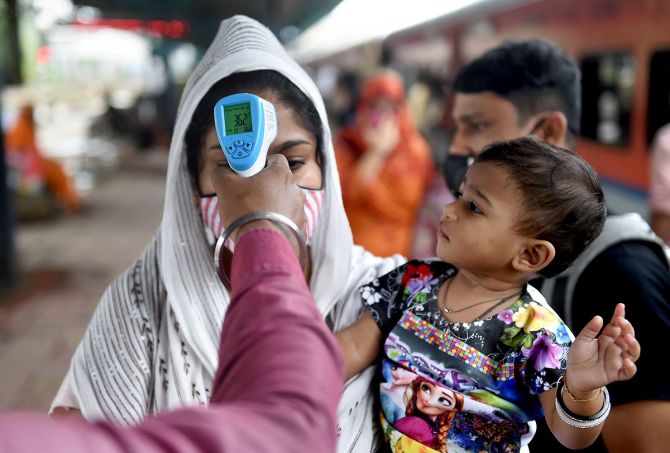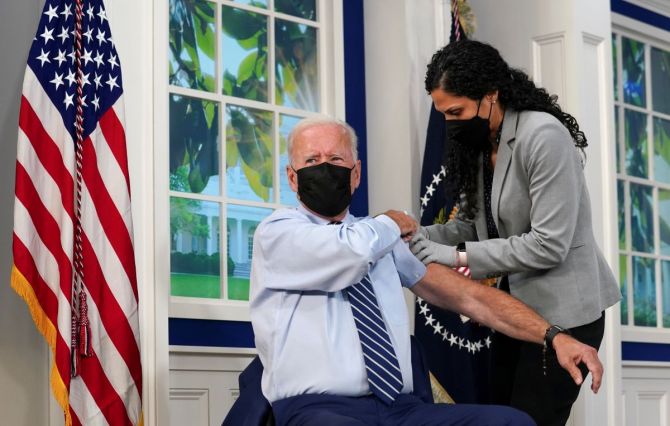 | « Back to article | Print this article |

Folks, do you know the answer to these easy enough questions?
How do you gain immunity from COVID-19?
Right, you can gain it by vaccinating yourself with two doses of a vaccine against COVID-19, like Covishield.
Or by catching/contracting COVID-19.
Although, it is important to note, taking a vaccine after having the disease is crucial too*.
How do you raise the general immunity levels of a segment of population quickly?
Yup. By immunising.
But, yes, the same segment of population can also gain immunity without vaccination, rather slowly, when COVID-19 travel its way through the population, man by man, especially when it's a contagious variety like the Delta variant. Ie that much talked about herd immunity.
That's most definitely not the ideal way that vaccine scientists, doctors and responsible leaders would like a population to gain immunity.
Why? It quite obviously comes with a high human cost.
But... It can also be inevitable.
Especially ever since the COVID-19 virus spawned its much deadlier Delta offspring and COVID has been with us for such a long time.
After 18 months of being cooped up by movement restrictions, it's pretty hard to keep curbs in place.
It's only human that folks will begin to buck precautions.
Travel a bit. Meet people a bit.
Get incautious a bit.
And inevitably, more and more of us will get exposed, even if not vaccinated.
If it is inevitable, what happens next?
What will happen to us in India?
Let's ask this of Dr Monica Gandhi, an infectious disease specialist and professor of medicine at University of California San Francisco, who has been writing clear-sighted, helpful columns on COVID-19 for The Washington Post, that are informative for the rest of the world too.
In Part II of her interview to Rediff.com's Vaihayasi Pande Daniel, Dr Gandhi addresses this question and also the issue of boosters and world vaccine equity.
Earlier in the conversation (Part I of the interview), you referred to what was happening in the (American) South, where people are refusing to wear masks or vaccinate.
The Delta variant is working its way through the population and bringing natural immunity, because there are also no restrictions in place either.
There will be a great human price for that and it is not the way to do it -- as you emphasised several times --- but it would seem inevitable.
Can the same inevitably happen in India? There are still restrictions in place. But given India's population and our need to survive, the restrictions do an incomplete job. While we don't have anti-vaxxers, we have huge swathes yet to be vaccinated. Post the second wave we have pretty high seroprevalence.
So in some ways, isn't India situation quite similar to the US, right?
Yes, you are correct.
If cases stay low from either end -- (either due to) natural immunity or vaccination -- then at some point restrictions should be removed.
Please see the piece I wrote in The Washington Post today.
This was how Dr Gandhi explained it in The Washington Post:
'So, what will endemic COVID-19 look like?
If we can tamp down viral circulation globally and largely strip the virus of its ability to cause severe disease, through vaccination, the world can resume a version of the normalcy we so desperately crave.
Outbreaks of severe disease will occur among populations unwilling to be vaccinated, as we see with measles, but vaccine mandates can help increase vaccination uptake. Because of this and naturally acquired immunity, COVID-19 will go the way of other respiratory viruses over which we have control'.

There's a sort of a mixed view about boosters in America at the moment. US Surgeon General Dr Vivek Murthy has said that we can do boosters for the people of the US, and we can also help the world vaccinate.
There are, of course, practical considerations for this reasoning. A lot of Americans got their last vaccination a long time ago, because they received Pfizer or Moderna, that has a smaller gap between doses. What is your take on boosters?
I do think, overall, that there are certain populations that likely will need boosters first in the United States, that we can use our doses for them. And I do think the FDA (US federal agency, the Food and Drug Administration) is going to settle out on some kind of arbitrary age number tomorrow, likely 60 or 65 (which the FDA did on September 22 for those 65 and above).
Although the data in most countries looks very good for older patients, we in the US did what Israel did, which is have a very short interval between doses.
I actually think that hurt us because there's less of an immune response when you have too short of time between doses and that's what's happening in Israel and the US, when they adhered to a two or three-week schedule.
We're going to go more on data from Israel, than other countries. And probably boost those over 60 or 65. And then maybe healthcare workers, who are exposed a lot, and then those in long-term care facilities.
I definitely think the data is too mixed to boost everyone in United States now, including like healthy 40-year-olds.
That will be met with a lot of controversy and the global vaccine equity issue is looming large. Saying that you can do it all, doesn't seem to make sense.
The G7 countries pledged on June 7, when Biden went to the G7 meeting (at Cornwall, England), that they would donate 2 billion doses. The US said 500 million, in addition to what they'd already pledged, and other countries (together) said 2 billion.
And none of them have come through. Not one. And it's been three months.
We've only given out 120 million doses from the US. And we said we were going to give out 500 million more, and we haven't touched that (number yet).
So, I don't think that's accurate for people to say that you can do it all. At least promises have not been kept that were made three months ago. That's what I'm worried about.
Even if you want to just take away the moral and ethical argument, there's a practical pandemic argument (that you just made), that it is dangerous for the United States not to help vaccinate the world.
I agree that, usually, when the virus is still circulating, older people are more at risk.
And America has such a large older population as well?
Yes. So, I have no doubt that what's going to be approved.

Basically, summing it up, you're saying it might become a big moral issue if they start taking the booster to 40- year-olds. But till then, maybe not?
Yes.
(Laughing) The moral issue doesn't seem to have swayed rich countries so far.
What's going to sway rich countries is more of a practical issue, which is, there is a public health argument about variants and about no one being safe until everyone's safe and about global trade, travel and geopolitical relations.
It's going to be more the practical argument that (will hold water) -- there's so many calls for it, not just from the organisation that it makes sense should be calling for it, which is the World Health Organization, but everyone else too. There's just a large world pressure.
The moral and ethical thing doesn't seem to be swaying people. We've had these vaccines, fundamentally authorised since December 14. India and South Africa appealed to the World Trade Organization on October 7 2020, saying we anticipate that just because it hasn't hit us as hard yet, it's going to happen. And please, waive the patents for and invoke the TRIPS Agreement waiver to make vaccines (cheaply available) and the World Trade Organization said no.
And then at the beginning of March in India, we all know what happened. The moral thing does not seem to be swaying rich countries at all.
 IMAGE: Dr Monica Gandhi. Photograph: Kind courtesy Dr Monica Gandhi
IMAGE: Dr Monica Gandhi. Photograph: Kind courtesy Dr Monica GandhiWhen you see the pictures coming out of America in some places it looks like COVID-19 has gone totally. Like Facebook pics of friends/family show people busy partying without any precautions. Life is normalising in New York. Broadway is open.
Leave aside the South, which is still suffering very badly from COVID-19, do you think America is normalising too quickly? And there was also a recent study that six feet is not enough distance and that kind of stuff.
Well, it's a great question. I do think that the pressure to open up in the United States came about politically, because of the elections.
I mean, it was a big sticking point that (former US President Donald J) Trump said 'If'I get nominated, I won't keep the country closed down and if (US President Joe R) Biden does, he'll keep it closed down'.
And then Biden said: 'No, I won't keep it closed down' and he didn't.
The country opened, definitely not around the time he got elected, because we were still in a surge, but it did open through the spring and summer.
What happened is that when the country opened, it was during a good period, between the (attack of the) Alpha and Delta variants, and there really were low case numbers and it was a healthy period in the United States. It was very short - about six weeks. But it was valid to open because it looked good.
Then once you open -- and Delta hit -- going back in a country like the United States is very difficult.
The same thing happened in the UK. It's why people said don't open on July 19 there, because you're not going to be able to walk this back.
Do I think that human behaviour contributed to the rise of the Delta variant in the US?
Absolutely.
I mean, we were open, there's no doubt. And we also had masks off for the vaccinated, which was this way that the CDC (US federal agency Centre for Disease Control) wanted to incentivise people to get vaccinated.
But no other country had taken off masks selectively, for the vaccinated. All countries lift masks at the same time for their population, because it's too confusing to lift it for one part of the population!
So, then they had to put it (the masks) back, which also led to a lot of political issues. We are too mixed. This country is too politicised.
There'll be many articles written on what happened here in the United States (during the pandemic). It's very concerning to sort of watch our trajectory.
We lost our place in being first in the epidemic, when it hit India so hard, but we were actually the epicentre of the epidemic from essentially April 2020, for almost an entire year. We had such high cases. We were the country that had the most mixed response. The UK (which also had a mixed response) got on top of it.
So, yes, as an infectious disease doctor, I'm very concerned about our trajectory in the United States
But do I think that it's wrong for New York to be open now? No, because New York, just like San Francisco, which is not as open, by the way, has high rates of immunity. They are responding to their localised pandemic.
The weird part about the United States is that we're 50 different countries, and that's sometimes hard, for people who don't live here, to realise. Like we (in California) have nothing in common with Louisiana. We are just so different.
It's kind of like saying, should Denmark be open in the EU, if Germany isn't totally open? We're totally different, where it's like the EU having 400 million people in it. And every country is different. In the US, every state is different.
*According to Dr Swapneil Parikh, Mumbai physician, co-author of The Coronavirus: What you Need to Know about the Global Pandemic: Vaccination reduced risk of symptomatic COVID-19 reinfection by any strain by 64.2% (95% CI: 26.5,83.8) in those previously infected. The risk of symptomatic COVID-19 reinfection caused by Delta was reduced by 79.1% (95% CI: 25.1,96.1)
Feature Presentation: Aslam Hunani/Rediff.com